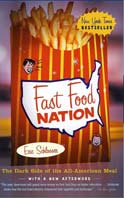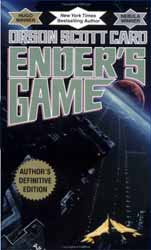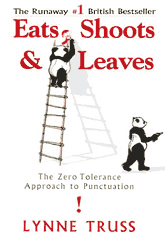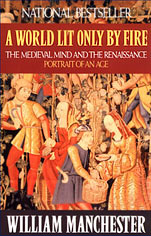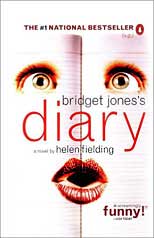So many people had recommended Fast Food Nation by Eric Schlosser that I bought the audiobook on Audible.com and listened to all 9 hours. I have mixed opinions about it. On the one hand Schlosser does a wonderful job describing the history of the fast food industry with terrific case studies of McDonalds and Carl’s Jr. Visionary entrepreneurs brought America efficiently prepared meals at prices low enough to make the food affordable to all. Schlosser also expertly delves into the the structure and participants of the entire industry, from the meatpackers and potato farmers to the franchisees and corporate marketeers. The research effort that went into this book are well deserving of praise. I was especially bothered to learn about how in-bed fast-food marketers have become with our public schools, with the schools pimping junk food to students in order to raise revenue. It is shameful that we are trading off the health of our children for the tax dollars that should be going into our schools.
Reviews
Ender’s Game – Orson Scott Card
Winner of the Hugo and Nebula Awards, Ender’s Game by Orson Scott Card revolves around a young boy, Ender Wiggin, who is selected to train to become a fleet commander to protect earth from an alien invasion. The training takes place at a distant Battle School in space where the young and brilliant Ender is repeatedly pushed to his limits to mold him into what he is needed to be, to become the next commander and win the war against the invaders.
I’ve read Ender’s Game 5 or 6 times in the last 15 years, and recently listened to the audiobook. I honestly think that Ender’s Game is the best piece of science fiction I have ever read. Card is unusual as a science fiction writer in that he delves deeply into the psychology of his main characters and their complex inter-relationships. Nothing is as black and white as it may seem. There is goodness and honor in Ender’s enemies as well as a willingness to manipulate and kill in Ender. Ender is constantly faced with hard choices upon which his survival and the fate of the planet depend.
Eats, Shoots and Leaves – Lynne Truss
Note to self: use more semi-colons.
Lynn Truss has written a delightful best-seller on the art of using commas, apostrophes, and semi-colons in her Eats, Shoots & Leaves: The Zero Tolerance Approach to Punctuation. After reading this book all I can think of is that I need to use semi-colons more often. Eats, Shoots & Leaves is both a useful guide to punctuation (primarily from a British perspective) and a witty and humorous rant against the declining use of proper punctuation in our culture. Ms. Truss frequently delves into the historical roots of many of the punctuation and type formatting standards we take for granted today.
How could a book on punctuation make it to the best seller list and stay there for… how many months has it been? One reason is by being well written and entertaining. Another reason is that those of us who read books also often like to write. Since the dawn of email and the Internet we’ve been writing much more than we would ever have expected to. As such, many of us are on the one hand appalled by the lack of proper punctuation populating the emails of those born around the same time as the personal computer, and on the other hand trying to remember what exactly those rules were that we learned so long ago. Eats, Shoots & Leaves appeals to us for both reasons; Truss lambasts the awful punctuation she sees daily while gently explaining the guidelines for doing it right. (I did it! I used a semi-colon in a sentence!)
A World Lit Only By Fire – William Manchester
Author William Manchester recently passed away which has prompted me to re-read some of his books. One favorite is A World Lit Only by Fire : The Medieval Mind and the Renaissance – Portrait of an Age. Manchester is often accused of being a “popular” historian, more focused on narrative than getting his facts straight. To these detractors I say, phooey. Unlike many history books which are the world’s best cure for insomnia, A World Lit Only By Fire is highly readable, entertaining, and enlightening. Manchester paints a grimly realistic picture of what life was like in the middle ages including the stench, the violence, and the pervasive Roman Catholic Church. He shows the seeds and the blossoming of the Renaissance – the combination of technology (printing press), brilliant enlightened minds (such as Erasmus and DaVinci), and Papal funding that brought about a full scale shift in the consciousness of the Western world.
Bridget Jones – Helen Fielding
Helen Fielding’s Bridget Jones books are the best antidote I can think of for the grumpies, in my case most recently induced by an unexpected 5 hour layover at SFO. Fortunately most airports these days carry small but decent book stores and even more fortunately in this particular instance the SFO bookstore carried Bridget Jones.
Cervante-esque in their humour, Bridget Jones’s Diary and its sequel Bridget Jones: The Edge of Reason, carry us on a delightful romp through the life and loves of Bridget Jones, a thirty something London girl who can’t quite seem to get anything right, but for whom life magically all works out in the end. The first book is loosely themed around Jane Austin’s Pride and Prejudice, with the male love interest, who Bridget at first spurns, is a one Mark Darcy, a deliciously modern day character equivalent of the first Darcy.
When the Bridget Jones Diary first came out I was bemused to read some reviews, by men naturally, who were appalled by Bridget’s shallow self-obsessions with weight, cigarrettes, drinking, and “shagging”. Well my friends, believe it or not, Bridget’s diary does indeed express the way that most of us single women think and feel. Which is exactly why it is so hilarious. Bridget is exposing our innermost insecurities and obsessions for the whole world to read.
Benjamin Franklin – Walter Isaacson
Walter Isaacson’s highly readable Benjamin Franklin: An American Life tells the story of the extraordinary life of our most colorful founding father. One cannot help after reading this book that Ben Franklin would have fit right into today’s urban society. Wonderfully open-minded, witty, curious, practical, and incorrigibly flirtatious, he would have made the most interesting company even today. Reading Isaacson’s book, I was struck not only by Franklin’s accomplishments and his contributions to the success of our revolution and our constitution, but also by his contributions to the set of values that define what is an American.
In Isaacson’s words,
Benjamin Franklin is the founding father who winks at us… He was, during his eighty-four-year-long life, America’s best scientist, inventor, diplomat, writer, and business strategist, and he was also one of its most practical, though not most profound, political thinkers. He proved by flying a kite that lightning was electricity, and he invented a rod to tame it. He devised bifocal glasses and clean burning stoves, charts of the Gulf Stream and theories about the contagious nature of the common cold. He launched various civic improvement schemes, such as a lending library, college, volunteer fire corps, insurance association, and matching grant fund-raiser. He helped invent America’s unique style of homespun humor and philosophical pragmatism. In foreign policy, he created an approach that wove together idealism with balance-of-power realism. And in politics, he proposed seminal plans for uniting the colonies and creating a federal model for a national government.
